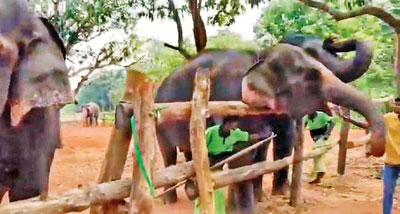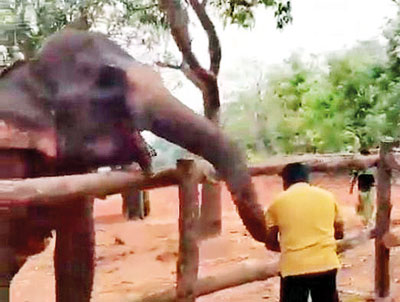News
Pinnawala elephants may fill gap for perahera duty, instead of private breeding
View(s):By Kasun Warakapitiya
With less than a month left for the Esala Perahara, captive elephant owners have suggested ways of dealing with the shortage of elephants.
However, the state authorities are not too happy with the elephant owners’s ideas, including releasing some elephants from the Pinnawala elephant orphanage to temples and devalayas. They are not however completely against elephant breeding programmes.
Captive elephant owners say there are not enough animals for peraheras.
The Department of National Zoological Gardens does not agree to provide its animals to temples and devalayas. But it can train a group of elephants for use in peraheras but with conditions attached.
The department’s Director General, Ranjan Marasinghe, told the Sunday Times that they would not provide the elephants to a third party to take care of or to use them in peraheras.

Elephants at Pinnawala
There are five elephants in the Pinnawala orphanage that are trained to be used for peraheras and three of them could be provided on request, he said. “In such an event, the animals would be provided along with the zoo’s mahouts and veterinary team.’’
He said the animals, which were court objects, would not be provided.
However, as the National Zoological Gardens is engaging in ex-situ conservation (outside of its natural habitat), it supports breeding that is done according to the law and based on science.
Zoo employees also expressed concern over the well-being of elephants handed over to a third party. They ask: Who would take responsibility if animals belonging to the zoo are ill-treated and neglected?
Chandana Sooriyabandara, Director General of the Department of Wildlife Conservation, said Pinnawela elephants could only be handed over to private care according to a state policy decision or a court order.

He said Pinnawela elephants could not be handed over to anyone as they were court property. Those animals could be released only on court rulings, and the advice of the Attorney General was needed before release.
“The DWC is not against elephant breeding in keeping with the Fauna and Flora Protection Ordinance. Any elephant held captive needs to be registered with the department. Even if a breeding centre is not registered and if an elephant conceives, gives birth, or has a stillbirth, the DWC needs to be informed,” he said.
Environmentalists said private elephant owners were trying to pull another stunt to reclaim their elephants, which lacked proper registration and permits.
Environmentalist and researcher Supun Lahiru Prakash said environmentalists had often pointed out that the National Zoological Gardens should train a group of elephants to be deployed for major cultural events such as Esala Perahera in Kandy. This could also help the authorities generate revenue.
However, the elephants deployed should be handled by the zoological gardens and should not be given to temples, devalayas, or any other private entity or person.
Mr. Prakash said there was enough evidence that private entities and individuals were unable to maintain elephants. In most cases, businessmen would get to maintain an animal. Then the animal is used for manual work and subjected to cruelty.
Mr. Praksah explained that if the elephants that are held by the government, particularly the elephants suspected to be captured from the wild are released back it would give a wrong impression of elephant conservation and animal rights point of view.
Environmentalists have received information regarding an illegal elephant-capturing racket where elephant calves are caught in the wild. They suspect captures are still happening.
Based on his knowledge, private owners had not had elephant calves bred by their captive elephants recently. He had even asked authorities for any reports of new-born animals.
Mr. Prakash suspects that the so-called recent elephant breeding programmes are another way through which illegal elephant-capturing racketeers legitimise wild-caught elephant calves through registration.
The environmentalist added that the DWC should have a strong and transparent inspection process to deal with private elephant breeding centres and hospitals.
Environmental lawyer Jagath Gunawardena explained that according to the Fauna and Flora Protection Ordinance, the Sri Lankan elephant is in its own category, which also provides animal protection similar to an animal which is strictly protected.
Therefore, it is mandatory for the department to protect the species and ensure its survival. Elephants can only be held captive under a person’s registration and a permit issued in the name of the person. And they are custodians, not owners.
He said the principle of joint custodianship applies to wildlife, and so the department can only give custodianship to an individual to keep an elephant, but they do not have the power to give ownership.
According to the law, elephant breeding can only be operated by the government.
Mr. Gunawardena clarified that the private custodians do not have experience in breeding elephants as well and had not even attempted to produce captive elephants in the past. Besides, the mahouts are not trained in the matter.
He said elephants are handed over for cultural and religious purposes and can not be used for any other purposes. It is illegal to use them for tourism.
Mr. Gunawardena said elephants that are subjects of court cases are deemed as productions and cannot be handed over to any third party.
Animal rights activists, too, said elephants are now increasingly used in parades, races and rides.
However, elephant owner S.M. Roshan, alias ‘Ali Roshan’ who started the elephant breeding centre and hospital at Habrana, said the breeding programme is transparent.
He added that he wrote to the DWC and asked them to monitor and support the programme. He claimed the department had responded, saying it cannot get involved as environmentalists are objecting to the gazette on captive elephant regulations.
Meanwhile, the secretary of the Elephant Owners Association, Damsiri Bandara Karunaratna said more elephants are needed for cultural processions.
“Kandy Esala perahara, which consists of the main perahera and four main devala perahera, needs elephants. At the same time, the Ratnapura Saman devala perahera is also held. It too needs elephants, but it’s difficult to provide elephants to both events due to the lack of captive elephants,” he said.
He proposed that the zoo should be the custodian of excess bull elephants and should provide them to temples and devalayas.
Mr. Karunaratne added that this could be done according to agreement.
He also said that owners have also planned to breed their own elephants as a long-term solution.
The secretary of the association said mahouts should be trained in the traditional way. He admitted that there are shortcomings among the new mahouts.
He even offered to provide traditional mahouts for the zoo’s caretaker training programme.
The best way to say that you found the home of your dreams is by finding it on Hitad.lk. We have listings for apartments for sale or rent in Sri Lanka, no matter what locale you're looking for! Whether you live in Colombo, Galle, Kandy, Matara, Jaffna and more - we've got them all!

